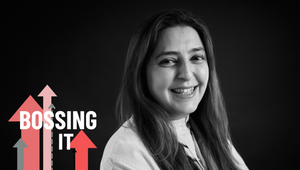
What the Great British Baking Show Can Teach Us about Bringing Out the Best In Our Creative Teams

The 14th season of The Great British Baking Show (otherwise known as Bake-Off outside the US) just concluded, and fans like me are really pleased with the outcome. My family has watched all 14 seasons, many of it we binged on Netflix to help us endure Shanghai’s (in)famous 2-month Covid lockdown last year.
As a marketing and advertising agency guy, however, I also could not help but notice that there are very strong parallels between the world of Bake-Off and the creative industries such as the one I work in. And I believe there is a lot agency folks (and clients) can learn from the show.
Both Bake-Off and the agency world share a lot in common. Both involve putting a bunch of highly talented and creative individuals in a shared physical space (be it a tent, or an office), requiring them to attack a challenge in an imaginative manner (be it a recipe, or “the brief”), which they would then have to present to a small group of so-called “experts” (be it judges, or clients)… all the while keeping within tight and often unrealistic deadlines.
So, what sets Bake-off apart from the plethora of other amateur cooking shows out there? I think Bake-Off is special in that its contestants seem genuinely happy AND high performing at the same time – a unique combination. There is simply none of the toxicity that we usually see in other reality cooking shows. In fact, it is not unusual to see bakers helping fellow competitors who are struggling with their bakes (a rarity in other shows). The fact that many participants eventually become good friends during taping, and many have been known to take holidays together only reinforces this view. And, yet, they are as competitive as can be so that their bakes can withstand the intense scrutiny of Paul Hollywood, Prue Leith, and in earlier seasons, the great Mary Berry.
We agency people know how difficult it is to create a high-performance, creative environment that is, at the same time, collaborative, nurturing and emotionally conducive. One that pushes people to do better, drives them to do more (with less and for less), while still protecting their emotional wellbeing.
So, how does the show and its producers achieve this and what can agencies learn from it?
Here are some of my observations about how Bake-Off creates a healthy creative culture:
Leave Egos at the Door
One ex-creative agency strategist who moved to the media agency side of the business (and now runs APAC for one of the big media agencies) once told me that he found it refreshing to work in an environment with less ego. Don’t get me wrong: there are a lot of really nice and extremely talented creatives. But it is no secret that creative departments often attract a disproportionate share of big creative egos.
Bake-Off, on the other hand, seems to attract highly creative people who can perform at the highest level while also being genuinely nice to work with. I suspect the producers screen participants not only for their skill, but also for their ability to coexist with others.
Agencies: Try to hire not only for talent but also for values.
Mix Negative Feedback with Some Positive
Don’t be fooled by the niceties of Bakeoff. The judges give frank and often sharp feedback. But they do it with charm, and often deliver it with a smile. More importantly, Paul and Prue are masters at ensuring every negative comment is accompanied by a positive one (yes, even the intimidating Paul Hollywood does this!). Watch and you’ll see how the judges seems to have perfected this. Was the sponge slightly overbaked? Yes, but the judges were quick to add that the flavor was spot-on. Was the matcha flavor too overwhelming? Yes, but the consolation was that the mille-feuille’s layers were flawless.
At the agency, giving negative feedback when critiquing the work is part of our job. However, there is a way to do it in a way that builds up rather than deflates individuals.
In pure Bake-Off style, we should learn to sandwich (no pun intended) negative feedback with positive words.
When the Pressure Increases, Work Harder to Make the Mood Lighter
Laughter takes the edge off tough meetings and assignments, especially when things start to go off the rails. At Bake-Off, this is the role Noel Fielding and Alison Hammond play masterfully: to take the temperature down when emotions in the tent reach the boiling point. Although Noel and Alison probably cannot bake to save their lives, these modern-day versions of the court jester play a crucial role in keeping things light and thus maintain the camaraderie and nurturing culture of the show.
At agencies, we must ask ourselves – do we make room only for performers in our creative teams? Or do we also value the people whose role it is to simply serve as the team’s emotional glue?
Don’t Treat Everybody Equally
This is counterintuitive. But I noticed Paul and Prue treat each contestant somewhat differently. At the start of every season, they are equally nice (or nicer) to contestants. But the feedback gets sharper once the show reaches the quarterfinals, when only the best of the batch remains. I realize they reserve most of their candor only to the highest performers. This is strategic: why be needlessly tough on people for whom this toughness will be wasted? This is also humane: the most toughness will achieve with individuals who cannot deliver is to make them feel worse than they already do which is unhelpful.
The lesson for agency leaders: expect a consistently high standard of delivery from everyone, but demand more from those who can deliver more. From them, you can expect a better rate of “return-on-toughness”.
The Environment Helps Create the Desired Culture
Bake-Off is shot on location at a grand estate in the English countryside. I believe this makes a difference to the culture of the show: it is difficult for contestants to be overly competitive against one another against a beautiful, pastoral paradise of a backdrop.
For us in the agency world, this means it is key to have an office space designed to make working together pleasant. More important than this is showing up to that shared space. I dare say it would be all for naught if everybody worked from home every day (a bad Covid-era hang-over). Bake-Off shows us that sharing a beautiful space together can help elevate creative output and the organizational culture.
The Great British Baking Show is more than just another successful show. It’s a powerful case study for how to bring out the best in creative people.
Here’s to season 15!















